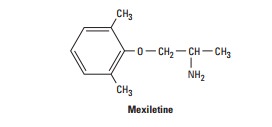Chapter: Basic & Clinical Pharmacology : Agents Used in Cardiac Arrhythmias
Mexiletine (SubGroup 1B)
MEXILETINE (SUBGROUP 1B)
Mexiletine
is an orally active congener of lidocaine. Its electro-physiologic and
antiarrhythmic actions are similar to those of lidocaine. (The anticonvulsant
phenytoin also exerts similar
electrophysiologic effects and has been used as an antiarrhythmic.) Mexiletine
is used in the treatment of ventricular arrhythmias. The elimination half-life
is 8–20 hours and permits administration two or three times per day. The usual
daily dosage of mexiletine is 600–1200 mg/d. Dose-related adverse effects are
seen frequently at therapeutic dosage. These are predominantly neurologic,
including tremor, blurred vision, and lethargy. Nausea is also a common effect.

Mexiletine
has also shown significant efficacy in relieving chronic pain, especially pain
due to diabetic neuropathy and nerve injury. The usual dosage is 450–750 mg/d
orally. This application is off label.
Related Topics